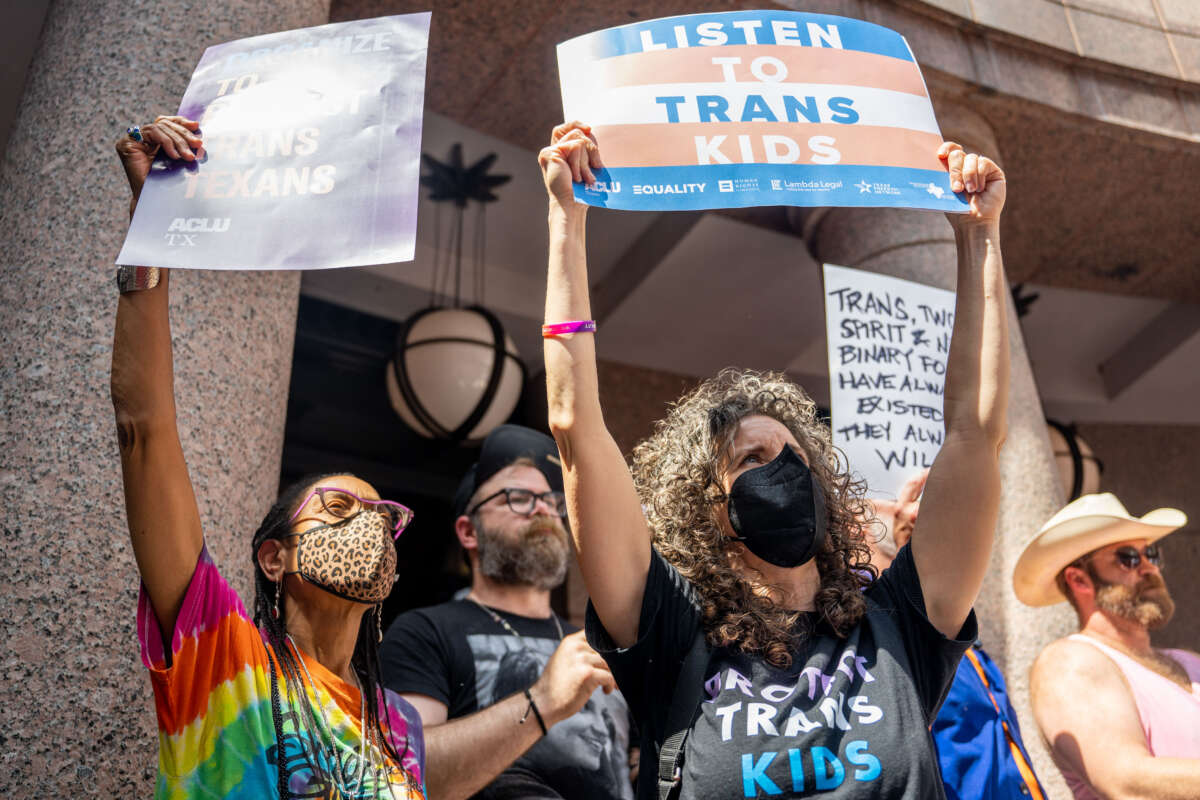Five families of transgender youth in Texas, plus three health care workers, are suing the state in an attempt to block its ban on gender-affirming care for minors from taking effect at the start of September. The American Civil Liberties Union of Texas and national legal groups are leading the lawsuit, which was filed late on Wednesday and names the state, the Texas attorney general and state medical board.
Although the law has not gone into effect, transgender youth and their families have already been suffering, said Brian Klosterboer, a staff attorney at the ACLU of Texas.
Families are moving out of state, he said — including one family in the lawsuit. The mom is temporarily moving out of state with her two children, one of whom is transgender and will likely need access to puberty blockers, a treatment that is banned under the current law. The dad is staying in Texas for his job.
“We all intend to return and reunite in our home once it is safe for Maeve to receive this care in the state,” the mother, identified in the lawsuit as Mary Moe, said. Moe, a plaintiff in the case, is using a pseudonym to protect her family’s identity. The rest of her family are using pseudonyms as well.
The ACLU of Texas, alongside national LGBTQ+ legal groups including Lambda Legal and the Transgender Law Center, are accusing Texas of violating the state constitution, which guarantees the right to parental autonomy. They argue that the law does so by preventing parents from accessing a medically necessary treatment and that it discriminates against parents who are exercising a fundamental right to make decisions about the care and custody of their children.
The law discriminates against transgender youth as well, the lawsuit argues, by treating them differently based on their sex and their transgender status and so violates their rights to equality and equal protection under the Texas Constitution. The ban also infringes on Texas’ physicians’ right of occupational freedom by mandating medical licenses be revoked if they provide transgender adolescent patients with gender-affirming care, the lawsuit reads.
“The consequences of this law have already been devastating, but will be even worse if the law takes effect on September 1st,” Klosterboer said.
This is especially clear to Moe’s family. Her 9-year-old daughter, Maeve, has vocally expressed from a young age that she is a girl, and a counselor advised the family when she was 5 that her gender identity should be affirmed to protect her mental health. Most people do not know that she is transgender. Whenever Maeve begins puberty, she will need puberty blockers to prevent masculinizing changes to her body that don’t align with her gender. She has always been worried about her body changing in ways that don’t match her true self — and the idea of going through a boy’s puberty extremely upsets her.
So the family is splitting up, for now.
Nathan Noe, a 16-year-old transgender boy living in Williamson County with his family, felt such intense gender dysphoria after he first got his period that he could barely leave his room and looked “haunted and empty” to his family. After he came out, and after the family met with a doctor to understand what he needed, Nathan started testosterone — which allowed him to enjoy life again and to focus in school, his mother says in the lawsuit.
Some of Nathan’s anxiety returned when he heard that Texas’ gender-affirming care law had passed. And in May, in anticipation of the law taking effect, the family’s doctor who prescribed hormones to Nathan stopped providing gender-affirming care. His top surgery consultation with a surgeon was also canceled after the law passed in May.
The passage of this bill into law came after a deeply emotional legislative session for LGBTQ+ and transgender Texans — after hundreds of them poured into the state capitol to protest bills that would cut medical care access for their families.
Klosterboer was at the Texas Capitol during the legislative session this year, and said that the passage of this bill — alongside the aftermath of how protesters against the bill were treated — left him a bit shell-shocked.
“This was a very brutal and rough legislative session, particularly when we saw trans people of color even being attacked in our state capitol building. We saw the state police using violence against peaceful protesters. We saw hundreds of people who testified and had their testimony cut off at midnight,” he said.
Adri Pérez, organizing director for the Texas Freedom Network, had a concussion after they were arrested and pinned down by Department of Public Safety troopers at the state capitol on May 2, as hundreds of trans and LGBTQ+ Texans protested the ban on gender-affirming care for minors.
“What happened to me was an extraordinary display of violence against a trans person in a building I loved and moved across the state to work in. Because I believed in this state, its people, and its leaders to do better,” Pérez said in an Instagram post late last month.
Across the country, lawsuits against gender-affirming care bans have largely succeeded in securing temporary injunctions to keep the bans from going into effect. In Tennessee, the exception, the state’s gender-affirming care ban for minors was allowed to go into effect early this month.
Klosterboer said that all Texans, not just transgender and LGBTQ+ Texans, should be paying attention to the ban on gender-affirming care for trans youth.
“We think it profoundly affects the rights of all Texans,” Klosterboer said. “The vast majority of Texans don’t want their government interfering with their private medical decisions.”
Media that fights fascism
Truthout is funded almost entirely by readers — that’s why we can speak truth to power and cut against the mainstream narrative. But independent journalists at Truthout face mounting political repression under Trump.
We rely on your support to survive McCarthyist censorship. Please make a tax-deductible one-time or monthly donation.
